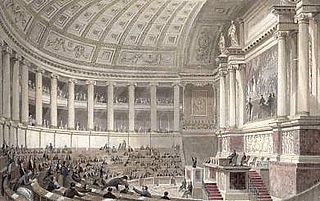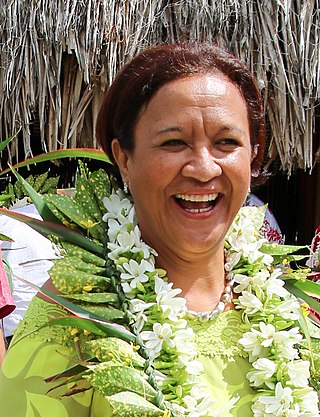 |
|---|
Elections to the French National Assembly were held in French Dahomey on 10 November 1946. The territory elected a single member to the Assembly. Sourou-Migan Apithy was the only candidate, and was elected unopposed. [1] Voter turnout was 59%.
 |
|---|
Elections to the French National Assembly were held in French Dahomey on 10 November 1946. The territory elected a single member to the Assembly. Sourou-Migan Apithy was the only candidate, and was elected unopposed. [1] Voter turnout was 59%.
| Candidate | Votes | % |
|---|---|---|
| Sourou-Migan Apithy | 32,977 | 100.00 |
| Total | 32,977 | 100.00 |
| Valid votes | 32,977 | 98.22 |
| Invalid/blank votes | 596 | 1.78 |
| Total votes | 33,573 | 100.00 |
| Registered voters/turnout | 57,153 | 58.74 |
| Source: Sternberger et al. | ||

The president of France, officially the president of the French Republic, is the executive head of state of France, and the commander-in-chief of the French Armed Forces. As the presidency is the supreme magistracy of the country, the position is the highest office in France. The powers, functions and duties of prior presidential offices, in addition to their relation with the prime minister and government of France, have over time differed with the various constitutional documents since the Second Republic.
A member of parliament (MP) is the representative in parliament of the people who live in their electoral district. In many countries with bicameral parliaments, this term refers only to members of the lower house since upper house members often have a different title. The terms congressman/congresswoman or deputy are equivalent terms used in other jurisdictions. The term parliamentarian is also sometimes used for members of parliament, but this may also be used to refer to unelected government officials with specific roles in a parliament and other expert advisers on parliamentary procedure such as the Senate parliamentarian in the United States. The term is also used to the characteristic of performing the duties of a member of a legislature, for example: "The two party leaders often disagreed on issues, but both were excellent parliamentarians and cooperated to get many good things done."

The prime minister of France, officially the prime minister of the French Republic, is the head of government of the French Republic and the leader of the Council of Ministers.

The National Assembly is the lower house of the bicameral French Parliament under the Fifth Republic, the upper house being the Senate. The National Assembly's legislators are known as députés, meaning "delegate" or "envoy" in English; etymologically, it is a cognate of the English word deputy, the standard term for legislators in many parliamentary systems.

The French Second Republic, officially the French Republic, was the second republican government of France. It existed from 1848 until its dissolution in 1852.

The National Assembly of Quebec is the legislative body of the province of Quebec in Canada. Legislators are called MNAs. The lieutenant governor of Quebec and the National Assembly compose the Legislature of Quebec, which operates in a fashion similar to those of other Westminster-style parliamentary systems. The assembly has 125 members elected first past the post from single-member districts.

The Senate is the upper house of the French Parliament, with the lower house being the National Assembly, the two houses constituting the legislature of France. The French Senate is made up of 348 senators elected by part of the country's local councillors, as well as by representatives of French citizens living abroad. Senators have six-year terms, with half of the seats up for election every three years.

France is a unitary semi-presidential republic with a bicameral legislature. Public officials in the legislative and executive branches are either elected by the citizens or appointed by elected officials. Referenda may also be called to consult the French citizenry directly on a particular question, especially one which concerns amendment to the Constitution.

Elections in Gabon take place within the framework of a presidential multi-party democracy with the Gabonese Democratic Party, in power since independence, as the dominant party. The President and National Assembly are directly elected, whilst the Senate is indirectly elected.

Elections in Togo take place within the framework of a presidential system. Both the President and the National Assembly are directly elected by voters. Togo is a one party dominant state with the Union for the Republic in power.

The Assembly of French Polynesia is the unicameral legislature of French Polynesia, an overseas country of the French Republic. It is located at Place Tarahoi in Pape'ete, Tahiti. It was established in its current form in 1996 although a Tahitian Assembly was first created in 1824. It consists of 57 members who are elected by popular vote for five years; the electoral system is based upon proportional representation in six multi-seat constituencies. Every constituency is represented by at least three representatives. Since 2001, the parity bill binds that the number of women matches the number of men elected to the assembly.

The National Assembly is the unicameral legislative house of the Parliament of Mauritania. The legislature currently has 176 deputies, elected for five-year terms in electoral districts or nationwide proportional lists.

The National Assembly of Mali is the unicameral country's legislative body of 147 voting members.

The People's Assembly is Syria's legislative authority. It has 250 members elected for a four-year term in 15 multi-seat constituencies. There are two main political fronts; the National Progressive Front and Popular Front for Change and Liberation. The 2012 elections, held on 7 May, resulted in a new parliament that, for the first time in four decades, was nominally based on a multi-party system. In 1938, Fares Al-Khoury became the first Christian to be elected Speaker. In 2016 Hadiya Khalaf Abbas, Ph.D., representing Deir Ezzor since 2003, became the first woman elected to be the Speaker. In 2017, Hammouda Sabbagh became the first Syriac Orthodox Christian to have held the post.

The Puducherry Legislative Assembly is the unicameral legislature of the Indian union territory (UT) of Puducherry, which comprises four districts: Puducherry, Karaikal, Mahé and Yanam. Out of eight union territories of India, only three have legislatures and they are Delhi, Puducherry and Jammu and Kashmir. After delimitation shortly after its formation, the Puducherry legislative assembly has 33 seats, of which 5 are reserved for candidates from scheduled castes and 3 members are nominated by the Government of India. 30 out of 33 Members are elected directly by the people on the basis of universal adult franchise and the remaining three are nominated by the central government. These nominated members enjoy same powers as elected members of the assembly.

Chamber of Deputies was a parliamentary body in France in the nineteenth and twentieth centuries:

The Kingdom of France was a constitutional monarchy from 3 September 1791 until 21 September 1792, when it was succeeded by the French First Republic.

Sophie Primas is a French politician. She represented the 9th constituency of Yvelines in the French National Assembly from 11 June 2010 to 30 September 2011. She has been a member of the French Senate representing the department of Yvelines since 25 September 2011. Formerly a member of the Union for a Popular Movement, she has been one of The Republicans since 2015.

Lana Tetuanui is a French politician who has served as a Senator for French Polynesia since 2015. A member of Tapura Huiraatira, she has been elected to the Assembly of French Polynesia since 2001.
Mikaele Kulimoetoke is a Wallisian politician and member of the Territorial Assembly of Wallis and Futuna. He was president of the Territorial Assembly of Wallis and Futuna from 2014 to 2017. He has represented Wallis and Futuna in the Senate of France since 2020.